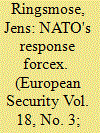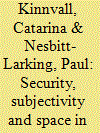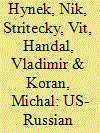|
|
|
Sort Order |
|
|
|
Items / Page
|
|
|
|
|
|
|
| Srl | Item |
| 1 |
ID:
096855


|
|
|
|
|
| Publication |
2009.
|
| Summary/Abstract |
This article suggests that the asymmetry of capabilities underlying the transatlantic partnership is NATO's main source of stability. Drawing on insights from mainstream political Realism, we stress the virtues of asymmetry (i.e. providing the allies with a wide bargaining space, increasing the cost of defiance and reducing intra-allied competition). The presence of these characteristics gives member states the incentive to prolong the convergence of their otherwise different political interests. In light of this theoretical model, we formulate some policy prescriptions. In particular, we argue that the USA and European countries should continue developing their own particular areas of expertise - i.e. implementing a functional division of labour. Therefore, contrary to widespread opinion, we conclude that the transatlantic military gap shall not be conceived as a burden, but rather as a key asset for the preservation of NATO's effectiveness.
|
|
|
|
|
|
|
|
|
|
|
|
|
|
|
|
| 2 |
ID:
096852


|
|
|
|
|
| Publication |
2009.
|
| Summary/Abstract |
At the Riga Summit in November 2006, NATO (North Atlantic Treaty Organization) declared the NATO Response Force (NRF) a fully operational capability. Yet only 8 months later - and behind closed doors - the Alliance's military authorities rescinded the declaration as it became increasingly clear that member states were unwilling to make the necessary commitments to the force. To this day, the force has been a qualified failure: while many allies have benefited from participating in the NRF, lack of concrete troop commitments and disagreement as to the force's operational role have largely eroded its credibility. This could change with the allies' recent adoption of a revised NRF-construct. However, as NATO is still in a state of strategic confusion, the NRF is likely to continue to be different things to different nations.
|
|
|
|
|
|
|
|
|
|
|
|
|
|
|
|
| 3 |
ID:
096853


|
|
|
|
|
| Publication |
2009.
|
| Summary/Abstract |
In this article, we call into question the assumptions that undergird conceptions of boundary, territory, community and ethno-cultural belonging in the constitution of European security. Both the term 'human security' as defined by development and human rights scholars and 'securitisation' as conceptualised by critical security studies concern the socio-psychological aspects of security. Yet, few attempts have been made to seriously discuss the psychological effects of securitisation on subjectivity and space. There is, as we will argue, a tendency in much literature to use concepts of 'existential security', 'fear', 'needs' and the 'politics of belonging' - obviously connected to the human mind and individual emotionality - without much space being devoted to the investigation of these concepts in terms of socio-psychological processes. We intend to fill this gap by discussing security and securitisation in terms of the psychology of subjectivity and space among young Muslims in Europe. Our principal argument is that through openness to the political psychology of subjectivity and space, and the (de)securitisation of both, we are able to develop more adequate maps of the European experience of danger and opportunity.
|
|
|
|
|
|
|
|
|
|
|
|
|
|
|
|
| 4 |
ID:
096851


|
|
|
|
|
| Publication |
2009.
|
| Summary/Abstract |
The article examines the reactions of selected European states to the US-performed 'reset' in relations with Russia and explores the ways in which they have been adapting to the new set-up. The article is divided into three parts: after the discussion of the substantive continuity and limited change in US foreign and security policy (USFSP), the multilateral and bilateral dimensions of USFSP procedure are examined through John Ruggie's theoretical observations. The second part of the article deals with implications of the USFSP for Central-Eastern European countries. This part begins with a discussion of Russian attempts to wheedle Europe into embracing its plans for new European security architecture. The next section sheds light on the unexpected process of strategic realignment of the region (USA/NATO/EU/CSDP) and simultaneous transformation of the special relationship with the USA into 'normal life'. The third part of the article tackles the implications of heightened US-Russian bilateralism for Germany. Authors' findings, many of them based on conducted elite interviews, suggest the contrary process, namely Germany's strengthened multilateral commitment to the EU and specifically to European Security and Defence Policy, limiting the bilateral option to energy trade with Russia. What follows are concluding remarks.
|
|
|
|
|
|
|
|
|
|
|
|
|
|
|
|
| 5 |
ID:
096854


|
|
|
|
|
| Publication |
2009.
|
| Summary/Abstract |
This paper analyzes the preferences of European defense actors vis- -vis the European security and defense policy (ESDP) with a view to identifying the main ideational points of convergence and fault lines that structure this policy domain. In an exploratory analysis that relies on an original data-set compiled from systematic interviews conducted with 73 ESDP actors in France, the UK, Germany, and Brussels, we address two research questions. First, what do ESDP actors think about ESDP? Second, can we classify their preferences according to sociological factors that underpin the ESDP domain? To conceptualize the belief system of ESDP actors, we propose a typology that distinguishes (1) the social context in which ESDP actors are embedded and (2) the specific ESDP aspects about which preferences are shaped. Our results suggest that both national and occupational variables play an important role in explaining the preferences of ESDP actors.
|
|
|
|
|
|
|
|
|
|
|
|
|
|
|
|
|
|
|
|
|